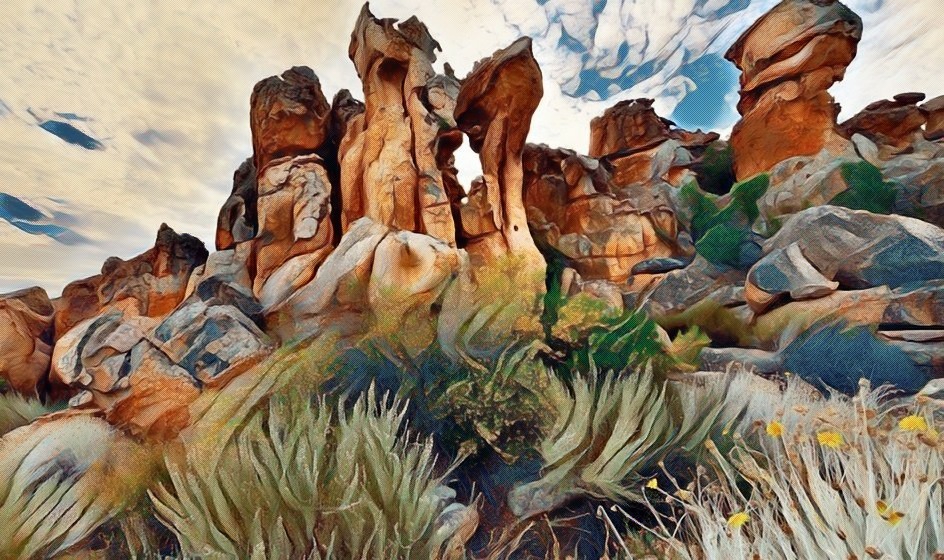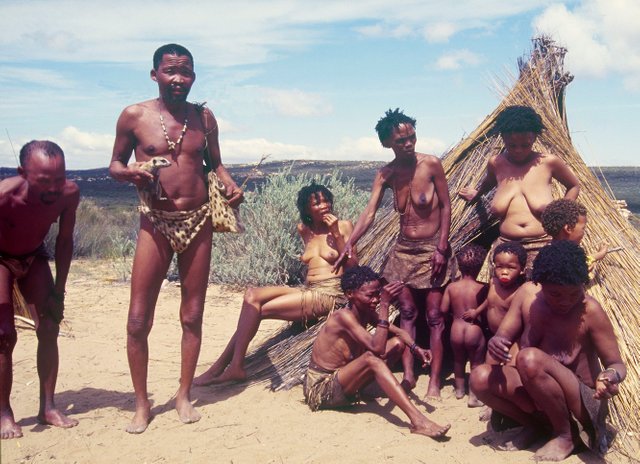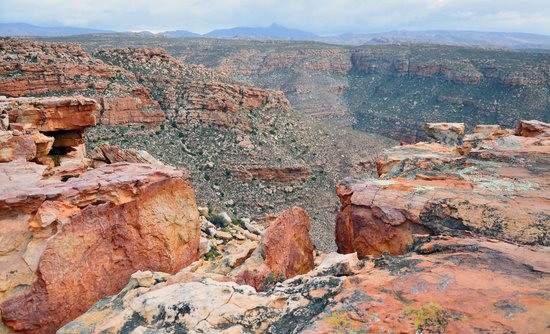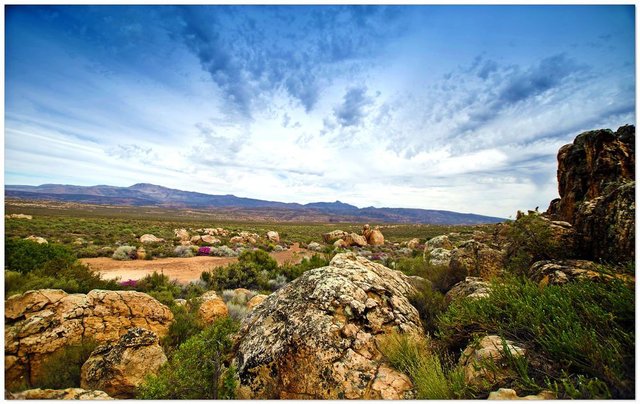With pics and audio reading: https://goo.gl/abYogk

Dear Friend and I were walking along one of the dirt roads, on the private game ranch, where we had a restaurant. Making our way to the manager's office a pickup truck approached us. A marvellous sound came from the back of it. Happy joyful fun sounds. As the pick-up passed us we observed what looked like a group of children, of all ages. We were somewhat surprised and intrigued, not aware of children on the ranch, certainly not that many. The back of the pickup had been packed with them.
Thoroughly curious we enquired at the office where the children were from, and why they were on the ranch. Oh no, we were informed, they weren't kids, they were a group of Bushmen that had come to live on the game ranch. They are a small people, and this group had a joyful uninhibitedness of being, hence seeming like a group of children in passing. We were not aware of Bushmen still living in South Africa, let alone the area we were in, which is in the south of the country. Bushmen had not been in that area for a long time.
Little by little we discovered the full story. The owners of the game ranch had read an article in the newspaper about this group of Bushmen. The article stated that they were the last surviving group of South African Bushmen. There were, and still are, other groups of Bushmen in Namibia and Botswana. This group had been living in the southern Kalahari on a private farm. They had fallen on hard times, as free land to roam on was no longer much of an option for them in that area. They were barely surviving, helping out shepherds in the area. But the shepherds themselves didn't have much to spare, as it is an absolute minimum wage job. It was a sad story indeed.
Moved by their plight, the owners decided to offer them the opportunity to relocate to the game ranch. At one time the Bushmen had lived all over the Southern African subcontinent as evidenced by their rock art. On the game ranch there were a number of particularly fine examples. If they had lived here once, the owners reasoned, why not again? Arrangements were made and the group of Bushmen relocated.

This picture is of some of them, taken years later.
Unbeknownst to us, as we had been living in isolation in a nearby desert valley before being invited to start a restaurant on the game ranch, the story of the Bushmen's relocation had been much of a feature in the news. The owners had taken them to the modern city centre in Cape Town, creating even more news. The Bushmen had a blast in the city. Uninhibited and free they had enjoyed it all tremendously. No culture shock there whatsoever. They had simply taken it in stride. Their joyous natures asserting their positive outlook. Of course the fact that some of the women had been topless had caused a bit of a stir. A few of the women had chosen to wear tops, aware of the potential reactions. I am always amazed at how most people simply assume that people living in non-technological ways are unaware and unsophisticated, when the reality of it is nothing of the sort.
Later, once we had become part of the group, because of the events that happened in The Little Pot on the Tiny Fire, I asked them about their visit to the city. They related the adventure with enthusiasm and excitement. I inquired separately, so as to get their individual opinions, if they would have liked to stay and live in the city. "Oh no, much too noisy," was the common response. Not one expressed any desire to do so, despite their conditions on the ranch being relatively meagre by city living standards.
Their situation was interesting and anomalous in many ways. They did not really have the ability to live off of the land. For one, they couldn't hunt the expensive game the owner's had stocked the ranch with. Even if they could, their hunting depends on poison. They had lost the ability to make the poison. In order to kill larger game with a bow and arrow one needs a powerful bow. Their bows did not possess such strength. (More on their bows here: http://buff.ly/22Lb6In) Besides, the owners had agreed to provide them with food. They would supplement their living by selling their traditional Bushmen crafts to the visitors that came to stay in the chalets on the game ranch.
The press of their relocation and the visit to the city centre had caught the attention of the public and in particular of academia. Many came to interview and try to study this group of Bushmen. They were marvellously convenient being only three hours drive from Cape Town, and the ranch also had a small airstrip. Our restaurant was not overly busy as the chalets were not that many. More were being added but typically only a few were occupied at any one time, mostly on the weekends, providing Dear Friend and I with plenty time to hang out with the Bushmen.
The Bushmen did not speak English, only their Bushman tongue, which I believe is called Nama, although they never used that term, only ever calling it "Bushman." They also spoke some Afrikaans, in which I was fluent. Most of the academics and visitors, many being from overseas, only spoke English. I found myself becoming the de-facto translator. I have written in some detail about this in my post: Painting the Cave of Expectation.
I would like to provide some of the behind the scenes story here. When the visitors came the bushmen were alerted, moving then to the area they had set-up to receive outsiders. They had built a few of their grass and branch shelters there to provide some notion of their traditional lifestyle. This area was free of anything modern they had acquired. Here they would hang around when the visitors and tourists came, making crafts to sell. The academics were poor customers on that front, but they did tip the Bushmen, especially when they heard what they wanted to hear.

The edge of the mountain plateau we were on.
What one sees is not always what is. And while they did not wear full western clothing, they did wear some. Kind of a half and half situation. Particularly sandals or some other kind of shoes. Barefoot might look cool and traditional, but it is not particularly comfortable most of the time. When the guests came to their visitor camp they would shed the western clothing. They were fully aware of what the visitors wanted. It was good for business. Not that they cared overly much about the business side of things. It was more that they understood the necessity.
Not that they had much to spend their money on anyway. Food was provided as well as some clothing. The ranch had a small store, really more of an extended pantry, which was opened once a week. It had been there for the ranch employees. The owners would bring various items from the city, when they came to the ranch, which they thought might be of interest. One such item was a radio. The ranch was remote, situated on a large plateau atop a mountain. No TV reception thus, not that TV would have been an option.
The radio caused some trouble, at least as much as was ever trouble with them, which wasn't much at all. Some of the Bushmen wanted it and others did not. Considerably more discussion was involved than we ever witnessed about anything else. Extensive conversation or discussion not being a typical part of their lifestyle. Eventually it was acquired. I don't know if they bought it or if it was given to them. Either way it ended up in their camp. The private camp away from the visitor-tourist area. After its acquisition the radio was never a big deal. Like everything else, it did not particularly matter much. Once a decision was made, it was made. After did not connect to before. The new reality was adapted to with that same easy acceptance of life they applied to everything.
I do have to emphasise, as a group of people, they were remarkably happy. Most of the time, since the visitors only tended to come on the weekends, they were left to their own devices. I never heard them complain. They had a positivity and a joy to them, always a happy mood at the camp. A very relaxed and laid back style of living. Nothing was hurried, nothing urgent. Things just were what they were. Since hunting and gathering was not a necessity, or needed at all, they were quite content. A decided Goodness was at the core of their being. For me and Dear Friend, a joy to connect to.
The only time there was trouble and ugliness was when alcohol was involved. Getting drunk made them nasty and belligerent. I asked some of them about it. They were somewhat perplexed by this. One of the men told me that when he drinks, "It's as if my brain gets turned around." They much preferred Marijuana, but it was not readily available to them. Marijuana had no adverse effects on them at all.
A lack of rules significantly contributed to their easy living. I never encountered any. They had no societal structure, except parents and children, and even then that was considerably absent in the usual sense. It took us a while to know whose children were whose. The children were simply taken care of by whoever was at hand. A natural Appropriateness permeated everything they did. What came their way they dealt with or attended to as the need arose. That was it really. They responded to life, not chasing after it. What came their way came their way.
I wish to emphasise something very strongly. What I am describing is what I experienced among this particular group of Bushmen, not Bushmen as a whole. I saw this logical error perpetrated constantly by the visitors and academics. They all assumed, completely without foundation, that what they encountered was representative for all Bushman. That is not necessarily the case.

Not always this green, but a typical view of the plateau.
I asked them if they knew any other Bushman. They did. In particular they knew the fellow that had starred in The Gods Must Be Crazy movies. From their comments about him it was clear they did not share some of his sensibilities. He lived in the deep Kalahari, in an extremely remote area, about as remote as one can get. They told me he had piles of the money he had earned from the movies just lying about him in the sand at his camp. The wind would blow it away and he used it to start fires. It was interesting to me. They were seldom negative, but I did get the distinct sense that they did not like him. I also got the impression he lived alone, an unusual circumstance. Contact with other Bushmen for them had been infrequent and not recent.
Continued in Part 2: https://buff.ly/2CbODvW
Excerpted from: The Young Man's Story
https://sylsabastian.blogspot.com/
https://www.facebook.com/syl.sabastian (For Comments)
All Subscribe Options: https://buff.ly/2DYsUKv (RSS Feed & email)